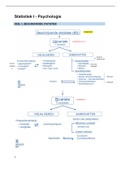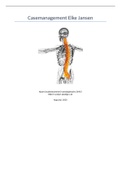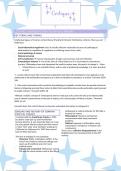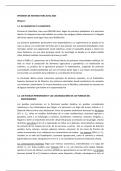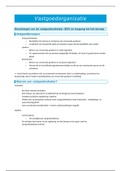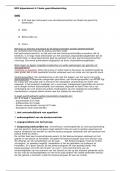Questions about the nature and reliability of evidence concerning past events,
the ways of organizing stories about them, the ways those stories may be
distorted and the purposes they may serve.
"The critical assessment of the ways in which historians try to
reconstruct past events as distinguished from the statements
they make about the past"
The Concerns of Historiography
- The history of history: understanding how historians of the past conceived of
their projects and the methods they used.
- The methods historians use in gathering data, analyzing it and communicating
it.
"History" is a complex term. Historiography tries to account for the different
ways in which historians have understood the past and to reconcile these
conflicting interpretations with the notion that there is some core of truth about
the past that can be known.
History is not just out there, but it must be reconstructed out of evidence that is
never self-explanatory.
An awareness of historiography is important to historians:
defines the difference between consumers <-> producers of historical
knowledge;
fundamental issues involved in the reconstruction of the past brought out
in the open in the debates.
Historigraphical debates clarify the assumptions underlying different approaches
to history and to make the reasons for disagreements among historians
comprehensible. It also helps to keep historians with different points of view in
conversation with one another.
For some decades, historians have been disputing the implications for out
discipline of the linguistic turn in philosophy and social theory. "Can we have any
access to the reality of the past?"
--> Relativism. Changed the discipline. Also reshaped by changes in the
ways historians access their sources and communicate their findings.
Increasingly turning to visual and oral materials, internet.
--> How to guarantee the authenticity? How to interpret these kinds
of evidence?
[This Book and Its Author overgeslagen]
Justifying the Study of the Past
Present-day historians are more likely to emphasize the value of history in
producing a collective sense of identity than its use in terms of providing
practical guidance. Communities need a shared understanding of their
past. A sense of a shared past may diffuse conflicts and promote efforts to
deal with problems of worldwide scope.
Importance of truthful history as a way of demolishing emotionally
charged myths about the past that may have dangerous consequences in
the present.
, Reminder to those who hold power today that they will some day have to
face the judgment of prosperity. History can contribute to respect for
human rights.
History can help us understand human behaviour.
A Short Field Guide to the Varieties of History
Political
Military Usually five rulers and nationstates a central
role. Oldest. Kings etc.
Diplomacy
Social: Closely associated with economic history. Emphasizes
the different ways human beings have been connected with one
another in different periods as members of families, communities
and social classes. Lower classes, mostly.
Cultural: Highlights the significance of the ways in which people have
made a living, the technology they have used, the effects of
flows of wealth. 20th century big growth. Social history
connected to the hard social sciences; cultural history
closer ties with anthropology and other humanties. The various ways
in which human groups have created meanings for themselves over
the course of history.
Economical: Often emphasize the importance of the lower classes as
majority.
Intellectual: historiography forms a subspecies of intellectual history. Tend
to emphasize the works of individuals who devoted
themselves to thought and writing. Sources mostly books and
unpublished papers and correspondence of thinkers and
authors.
Social and economic history: often depend on data that can be transformed
into numbers and analyzed statistically. What can be learned from the
documents?
Political and diplomatic history want to show what sources show about what
de actors where thinking.
Cultural history: offers the challenge of tracking down sources that are often
widely scattered and where more traditional historians would not think to look.
Museums, archives, private individuals.
2 History in Ancient and Medieval Times
The development of history has looked different to historians, depending on the
concerns of their own day.
--> In recent decades there has been increased interest in alternative
forms of history that existed alongside the "scientific" history and in the history
of non-European historical traditions.
The predominant ways of recording history have changed over time!
Herodotus and Thucidides
, Inherited a tradition of concern about the preservation of the memory of
the past.
Tried to create a realistic way of describing past events. Part of a broader
striving to understand the world and represent it accurately. Athens a
center of cultural innovation.
Anders dan de Chinezen, de Joden, Perzen en Egyptenaren: their attempt
to define history as a distinct method of telling the story of the past,
unique above all because of its devotion to discovering and transmitting
the truth about bygone events.
Defined history: the story of the thoughts and deeds of human begins.
Eliminated the gods from their explanation (unlike Homer). Should concern
with exceptional events that affected the lives of whole societies.
Herodotus
Undertook travels for information about various peoples involved (Persian wars).
Often indicated the sources of his information and critically evaluated them of his
audience. Behoud van kennis!
Thucydidus
Critical towards storytellers who fixed fables with facts. Wrote about things that
took place during his own time. Wrote only about war and politics, excluding
women. Geen retorische shiz, model for serious history writing today. But, he
rarely concluded actual words that leading actors had spoken.
After the 18th century --> elimination of imaginatively reconstructed speeches
from historical narrativves. Seperation between history and other forms of
literature.
They were rediscovered during the Renaissance and recognized as the
foundations fo the Western historiographical tradition. Very important
contribution: wrote their narratives down! Words were preserved and
reproduced. Could be compared with other documents --> more critical
understanding of the challenges of recording events.
History-Writing in the Hellenistic and Roman Worlds
Aristotle one of the first en most characterizations of the nature of history and its
relationship to other forms of thought. History had a special connection to
impirical truth that was missing in other genres of literature.
Polybius "wrote this first important work on the history of Rome" in middle of 2nd
cent. BC. Polybius and successors Livy and Tacitus inherited the models of
history by Herodotus and Thucydides.
New challenges: had to collect and evaluate sources from the distant past.
Difficulty of separating truth <-> legend.
Dealt with a widened scope. Required them to attempt to reconcile the
different chronologies of Rome. Polybius strove to cover the whole of the
known world of his day.
His successors invented the genre of the national history.
Historians of Rome --> question the causes of the success of the state.
Provided a framework of political history. Big influence on politics and
history writing in Europe.
,Livy, 100 jaar later. Aware of the problem of writing the history of events
centuries bfore own lifetime. Work of Caesar --> precedent for memoirs.
Plutarch considered the inventor of the genre of biography.
By the end of the 2nd century CE, Greek and Roman authors had
created an extensive tradition of historical writing and a tradition of
critical writing about historical methodology.
Lucian of Samosata's How to write a history
--> History should be well written, but it should keep its feel on the ground. The
historian should only start to write after investigation and note-taking. Free for
distortion, false coloring en misrepresentation.
Green and Roman historians wrote for a limited audience and took omens and
supernatural shiz seriously. Written history for a small, cultivated elite.
The Origins of Chinese Historiography
Confucius (551-479 BC), Chunqiu / Spring and Autumn Annals. Chronicle of
several centuries of events in one Chinese kingdom.
Sima Quan (c. 145-86 BC): most influential work of early Chinese history. Shiji.
Some kind of encyclopaedia. All aspects of human life and commented on the
lessons to be drawn from historical episodes. The past as best guide for action in
the present.
History, Judaism and Christianity
In Western World --> tradition of historical writing created by the Greeks and
Romans --> challenge with the rise of Christianity. After conversion of
Constantine --> new vision of the fast, closely linked to Christian teachings about
the world's future. Heavily influenced by the Bible.
Important: no more hope for imminent return of Jesus --> history will
continue for a period of unknown duration. Began to confront the problem
of integrating their own history in the larger historical framework from the
Bible and the Greeks and Romans.
Eusibius made more use of direct citations from his sources. Provided a
model for what would now be called intellectual history.
Scheiding West-Oost RR --> afgesneden van Byzantijnse schrijfdtradities. Ook
nieuwe politieke omstandigheden. New challenges to historical writing. Less to
no knowledge of the Greek language.
Augustine: acknowledged that human actions can be secondary causes of
historical events --> justification for the study of history in its own right. Wrote
the first example of autobiography.
History in the Middle Ages
Often seen as a detour. But, they adapted history to a new framework.
Eventhough it was dominated by religious belief, they thought themselves as
serving the cause of truth.
--> Decline is number of those who received the education needed to be a
historian. No Greek texts. Only clergy could read Latin.
,No more writing about a universal empire: now histories of seperate kingdoms
ruled by "barbarians", whose ancestors had lived outside of Rome.
Medieval historians often began their works with a summary of world
history, drawn from the Bible and Roman sources. Often tried to connect
their countrymen tot this universal past by claiming they were descended
from offspring of Noah or figures from antiquity.
Often written over several centuries, by multiple monks. Also, biased and
no explaination of the causes of the events.
Bede (ca. 735) Ecclesiastical History of the English People. Inseparable from the
political history of the rulers. Bede was unusual among medieval historians:
concern for accuracy and acknowledgement of his sources. First historian to
adopt the practice of dating events from the birth of Jesus (BC / AC).
Crowning of Charlemagne --> legacy of the Roman Empire had been passed on!
World was still in the age of the fourth empire (Biblical). Kept medieval historians
from recognizing the differences between their society and that of the classical
world.
History in the Chinese and Islamic Worlds
Tang Dynasty (618-906 CE) created an official History Bureau, charged with
recording the events of their reign. Next dynasties, too. Important political
function.
11th century: two authors argued for the importance of evidence from
archeology and inscriptions as a way of verifying claims made in written
sources and for the superiority of older sources, written closer to the time
of past events over more recent compilations.
Muslim scholars concerned with preserving the precise words of Muhammad.
Familiar of the Greco-Roman history and with the Jewish and Christian scriptures.
Used these for pre-Islamic chronicles.
Ibn Khaldun (1332-1406) produces a systematic critique of historical
thought that was more probing than anything written in the European west
until the Renaissance. Analyzed the reasons why historians might have
erroneous accounts of the past and other shiz like a failure to understand
a source's true meaning.
o Most important source of error: the ignorance of the laws governing
the transformations of human society. Human behaviour was
sufficiently consistent so that historians could distinguish what is
naturally possible from what is impossible when dealing with the
past.
Geoffrey de Villehardouin. History of the Kings of Britain, 1130. Earliest
written version of the legend of King Arthur. Way livelier than the chronicles.
During these times more complex society in Western Europe. Ability to read and
write no longer confined to monasteries. In 11th&12th centuries establishment of
the first universities. History not yet part of the studies. Growth of cities!
Important: feudal lords who wanted wrote their events down.
Urban chronicled were especially common in Germany and Italy. Machiavelli and
Guicciardini! Urban histories more inclusive, recording the concerns and actions
of local officials and guildsman. No crimes and fires. First examples of social
, history. Also, Universal chronicles that attempted to conclude the history of
the entire known world. Often highly inaccurate.
1400's. Froissart. Aware of the importance of truthfulness in the composing of
history. Close connections with leading political figures of the time. Accuracy!
Inclusion of incidents that cast his own patrons in an unfavourable light.
3 The Historiographical Revolution of the Early Modern Era
Renaissance revival of the culture of ancient Greece and Rome. Obsession with
antiquity and the impact of profound historical novelties (such as the discovery
of America and the invention of printing). Religious belief remained fundamental
to European civilization. Protestant Reformation made questions of faith more
explosive. New ways of understanding history --> changes in culture and society.
The Renaissance Revolution in Historiography
Beginning of nineteenth century: argued that Renaissance historians the origins
of many features of history as it is researched and presented today.
Valla's Discourse on the Forgery of Constantine (1439-1440). Applied the
new critical methods of humanism: careful scrutiny and comparison of
sources. Discovery of truth about the past!. Close study of classical
antiquity.
Demonstrated the change of Latin. Questioned the notion that the world of
his own day was still a direct continuation of the ancient past and the
claim that medieval Holy Roman Empire was substantially the same as its
predecessor.
Specialized fields of antiquarian research --> increasing confidence in their
ability to reconstruct the past on the basis of the traces it had left behind, rather
than relying on written accounts compiled later.
Renaissance historians stopped dividing history according to the framework of
the "four empires" inherited from the Bible. New: three periods: antiquity --> a
"middle age" from the fall of their western Roman Empire to their own day -->
new era in which they lived.
Redefinition the place of religion in human life in a way that left more place for
purely human concern, in particular for political engagement.
Renaissance humanism first arose in northern city-state republics of Northern
Italy, especially Florence. Alarmed by growing power of Medici.
Machiavelli & Guicciardini: their histories broke radically with the framework
of medieval historywriting:
Purely secular narratives that made no pretence of trying to fit events in to
a divinely ordained plan or something;
Treated the Italian city-states as autonomous entities and explained their
histories as the result of human power conflicts.
Vasari's Lives of the Artists (1550): collection of stories about leading Italian
artists and their major workss. Model for historical works dedicated to specific
forms of cultural activity.

